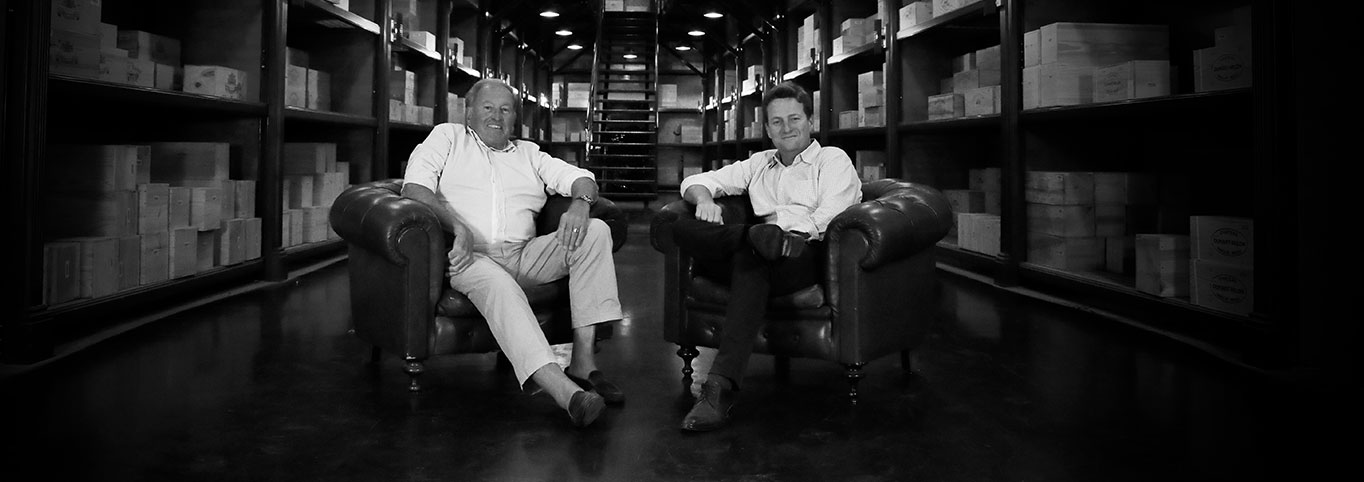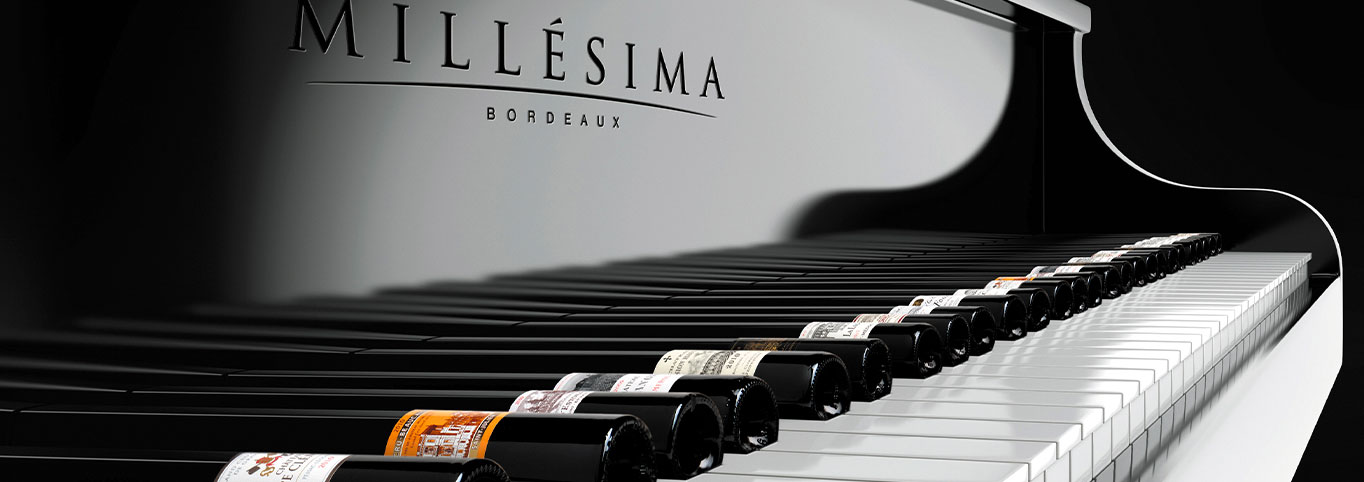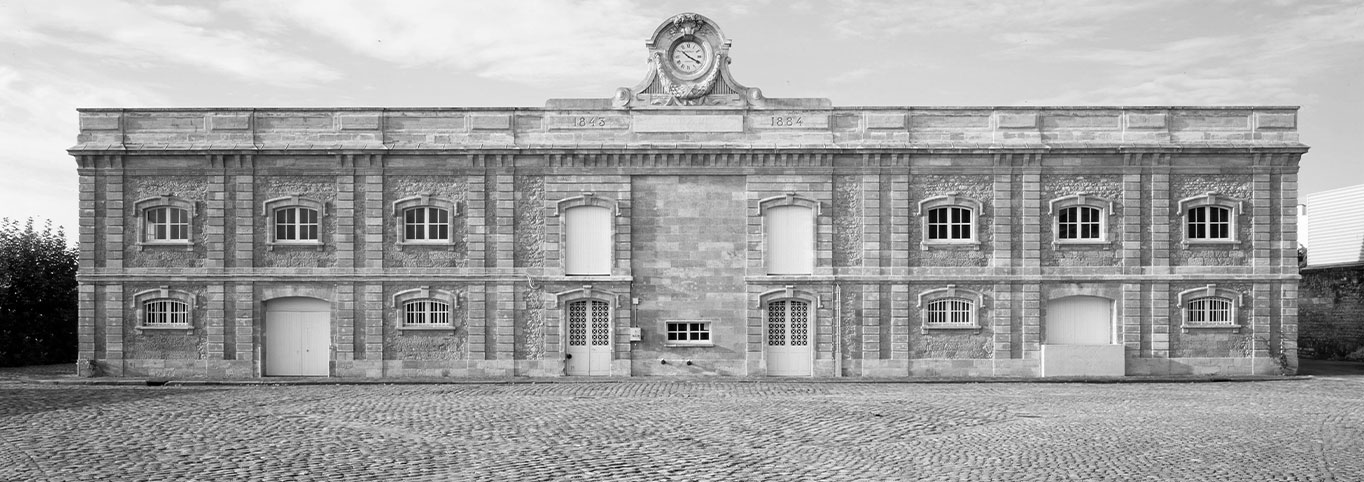JOINT INTERVIEW PATRICK & FABRICE BERNARD

Can you tell us how Millésima started?
Patrick : It all started in 1980. At that time I was Managing Director of Lucien Bernard & Cie, a flourishing family-run brandy business set up by my grandfather in 1928. I was not at all confident about the future of the business, which was made fragile by its monopolistic position. In November 1982, I presented two proposals to the board of directors. The first, adopted by the shareholders, was to buy a «Grand Cru Classé» in the Bordeaux region to diversify our business and stabilise our financial position. The second was to set up a Bordeaux wine trading business of «grand cru» wines bought as primeurs. This proposal was rejected on the basis of lack of experience. The board did, however, allow me to carry on with my project and bring my ideas to fruition. December 1982 therefore marked the month and year of the creation of «Vins des Grands Vignobles» backed by my brothers and some of my cousins. This decision had the effect of shaking up much more than my career and circle of friends, which consequently widened. Through my introduction into the world of wine my social environment also changed: I had to make a name for myself and associate it with this product. Until then, the Bernard family was unknown in the Bordeaux wine market. We were practically unknown outside of Cognac.
Fabrice : For you it was the obvious choice to market «grands crus classés».
Patrick : Yes, it’s true that Vins des Grands Vignobles was conceived from the very beginning as the name of a company that would exclusively sell «Bordeaux grands crus classés». To market this type of wine you are obligated to work though the Bordeaux wine market, controlled by three main actors: the châteaux, brokers and merchants. Indeed, the châteaux do not sell their wines directly either to private or to foreign buyers, but exclusively to Bordeaux merchants via the wine allocations system. The merchants then arrange the distribution of the wines within France and abroad. They are put into touch with the châteaux by the brokers whose commission is 2% on every transaction.

In hindsight, what was the turning point in the story of Millésima?
Patrick : Millésima went through several significant stages, marked by surges of acceleration. The most important step was undoubtedly changing from conventional trading to a mail order system. That was the move that gave structure to the company, the move that marked the creation of Millésima and determined its future.
Fabrice : B to C, with no sales to retail outlets, remains our sales model today and the concept upon which Millésima was built starting in 1987. Since then, only the tools put in place to keep this concept going have changed.
Patrick : We have moved from the old mail order system with surface mail and printed order forms, via facsimile, then by Minitel and finally the Internet in 1997.
Fabrice : Marketing Millésima abroad was undoubtedly another significant step in the development of the company.
Patrick : Indeed, selling Bordeaux fine wines by direct marketing to private buyers abroad was practically unheard of at the time. That was an historic move by Millésima! I started with Germany where there is a tradition of appreciating Bordeaux wines and where administrative formalities are simple. In 1992, I hired a German friend who lived in France. She was my first bilingual and bi-cultural advisor
Fabrice : Right from the start, you offered to answer customer queries by telephone, to talk with them and advise them.
Patrick : To me, it seemed indispensable that foreign customers could communicate in their native tongue, especially to put at ease those who might be afraid of pronouncing the name of a wine incorrectly
Fabrice : At Millésima, «opening up a country’s market» does not simply mean setting up a local structure or a subsidiary, but also being able to clearly communicate with the people of that country. At one time, you would «open up» the markets of various countries one after the other.
Patrick : Yes, indeed! Your mother believed that I had this delusion of grandeur, that I was getting ahead of myself. But I believe it was necessary. From the very beginning, I did not want Millésima to be limited to France. I started with Europe, then the U.S. and that was a great driving force. I did not want to depend on the struggling French market. That decision opened up wonderful opportunities of growth and development for us. When the Internet became widespread, we were able to simplify order and communication processes in all of the countries where we operated; each market had its own Website - even if everything was being controlled from our offices in Ambès

What hurdles did you encounter?
Patrick : We were often required to fight hard. We had to fight hard at the start to obtain allocations and get on the starting block. And there were a few setbacks. A sequence of complicated vintages gave us undeniable headaches, as did the Bordeaux-bashing mode in the U.S. and the 2008 financial crisis. There was a 40% decrease of sales in France and in Europe in 2009, a decrease further accentuated by the poor quality of the 2011 vintage the following year.
Fabrice : You have not mentioned your decision to widen the range of wines to include those from outside of the Bordeaux region! That was an adventure in itself. You must have really stirred up a storm in doing so. Patrick: True enough, the diversification of our range of wines to beyond Bordeaux was another one of the crucial decisions that have forged the reputation of Millésima. It didn’t sit well with me to have to limit our efforts to something we know inside out. But I had to fight against the system because I was significantly overstepping traditional lines of operation. I waited patiently for two years before prevailing.

The story of Millésima shows you were on your own several times. You made some risky bets!
Patrick : That’s why I feel no need to play poker! Millésima has given me all the adrenaline rush I could ever need! But that is the essence of the business of merchant. You must know how to take risks while knowing your subject to the core. And, speaking of that, wine tasting is extremely important. It enables you to know your wines well and to know what quantity to order. You must also know how to rate the vintage in relation to previous ones, to bring to light exceptional vintages. It’s the purchasing operation that makes all the difference.
Fabrice : The challenge is that once the buying season has finished there’s no going back. There are sometimes undiscovered exceptional wines with good value for money that were not detected in time. One can never be sure and doubts persist, but that must never halt progress. You must always forge ahead
Patrick : I would like to introduce a bit of subtlety to what I just said. You spoke of making bets and I agree but I insist on the fact that there is no speculation in what we do. Speculation means taking considerable risk. If we are able to sell 500 cases of wine we could take 600 or 700 more so as to have wine ready for delivery throughout the year and for the years ahead. But we would never take any more than that. There is no inherent truth to any vintage. Indeed, a subsequent vintage can affect the one before. That was the case with the 2012 vintage whose prices should have increased but suddenly dropped because the 2013 vintage was unsatisfactory. The sequence of vintages can upset the market both upwards and downwards. And where there are two great vintages, the second generally comes out cheaper. The 1990 vintage turned out to be cheaper than the 1989. Sometimes you have to lower the price of a wine to sell it even if the vintage is good.
Fabrice : That’s why I think we can call it speculation, all the same. You never know the price in advance and the market is in constant fluctuation. And I believe that there is no wine that cannot be sold.
Patrick : Yes, but it’s a reasonable bet albeit with safeguards. Everything is a question of the relation between our ability to sell such and such a château, with reference to our sales records, i.e. the number of customers who have already bought that particular château from us, and the quantity. In any case, refusing to buy is also a way of speculating. Each decision is an important commitment.

Can you tell us something about wine tasting?
Patrick : Tasting sessions are an essential component of our business. It is important to have precise ideas about each vintage. Some people think it is sufficient to trust Parker to know whether a wine is a great wine, a very great wine or exceptional. But Parker cannot help us at the beginning of the campaign, which is the time to place our orders. If you wait for Parker it is often too late to position yourself on the market.
Fabrice : You must be able to taste wines very early to determine which ones have real potential. You must also be able to keep in mind the last five or ten vintages from each producer to form a relevant opinion.
Patrick : Wine tasting is vital and has always been an important focus for Millésima. We have never purchased a wine without having tasted it several times. In the past there were wine tasting seasons. During the rest of the year, in order to keep a certain number of wines in mind, tasting sessions were arranged to compare various châteaux or vintages. Today, there are wine tasting sessions all year-round.
Fabrice :There is an increasing number of wines to taste: Rhone Valley, Bourgogne, Provence rosé, Champagne, Italian wines… During family gatherings we have fun with blind tastings. It is both a pleasure and a necessity
Patrick : Wine tasting can make all the difference as there are few merchants who have taught themselves this art. When a château markets its wine, most merchants wait for feedback from their buyers before placing orders. At Millésima we do things differently. We make sure we taste the wine two or three times. We have a good idea of what we are looking for, which enables us to place our orders immediately

Fabrice, you joined the company thirteen years ago, in December 2007. How did the transition work out?
Patrick : I wanted Fabrice to come and work at Millésima. I knew that he was mad about wine and that he found our product pleasing. His track record was also perfectly aligned with what we needed. His marketing studies and his successful career path at DIAC were proofs of the necessary skills he had acquired. He joined us and a period of adaptation was unnecessary. It was as if he had always been with us. That was the most surprising aspect for me.
Fabrice : When I joined Millésima, after my recruitment by the Bernard Group’s board of directors, I had no idea if my vision of things would fall in line with my father’s. I asked myself the question and examined our possible differences. But there was no need to. We were on the same wavelength from the start. That was reassuring for me, for my father and also for the team.
Patrick : And for the long lastingness of Millésima. I credit that to our DNA!
Fabrice : I then wondered what contribution I could make to the business and how I would be viewed. By my father, of course, but also by the team and the board of directors. It was not a foregone conclusion. On an in-house basis everything went smoothly. Then with time things fell into place.
Patrick : Like me, you started in the marketing department. But you made it your territory and established your mark there. Social media was your idea, I was not at all sure about that. But the results came through and I can only emphasise your clear vision of the future.
Fabrice :That can also be classed as the spirit of Millésima. Have a go, try out new things. It is true that we never hesitated to challenge one another - sometimes my ideas would work, but not always - what matters was the result. Another important aspect is that we have always been able to enjoy it!
Patrick :There has never been any conflict between us. I can only remember two reasons for strongly worded emails exchanged between us during those first few years. That’s all.
Fabrice : If the transfer between us went smoothly, it is because you wanted to pass me the reins and I wanted you to pass them to me. Giving and receiving are both indispensable. That can be explained by the respect we have one for the other.

Millésima is thirty years old now, but has kept the spirit of a start-up. You often talk about your disruptive strength, your perpetual state of questioning everything, your dynamic market research - qualifiers that today’s start-ups claim as their own.
Fabrice :Innovation is at the very core of our modus operandi. To be ahead in the field is a question of survival in our business. Competition is tough - yesterday it was supermarket chains, today it is Amazon and producers who want to sell directly to customers. But this competition is healthy because it is a driving force. A source of power that drives progress. For that, one must be forever open to change. I always say that the most important thing is to try. You do not always succeed but that is not the most important. What does count is to have tried a new path of action.
Patrick : At Millésima, we see areas ripe for investment as an incentive to go further still. Changing a system that works well is never easy, but I believe that growth depends on it. You have to go forward, retreat then go forward again. People are often scared of the unknown. But in most cases they finally realise that it was a good idea. That momentum for change is incidentally a question of life or death: it was decidedly this aspect that has enabled Millésima to keep going and to expand. Most of our competitors have not resisted.
Fabrice : With that in mind, we make sure that everyone is skilled in their craft, that everyone has enough space for their fulfilment, while being aware of what neighbours are doing. Because everything is interactive. Everyone is part of a system whose mechanism they must understand.

How would you currently describe Millésima, apart from what we have already touched upon?
Fabrice : Respect and trust are essential ingredients at Millésima: respect for the product, the customer and keeping one’s word. Our vocation is to offer the best possible service, a top-quality service befitting of the luxury positioning of our product. We are demanding at all levels: product choice (i.e. the greatest wines), their careful preservation in our 200-year old cellars at Le Paludate, and the way we take care of our customers. Our advisors always taste the wines they recommend, know the tastes of faithful customers and are capable of offering guidance to beginners. We share our passion for wine with others.
Patrick : You are forgetting respect for the teams. The notion of trust is fundamental. We train our employees so that they stay with us and gain greater skills. We also believe in transparency. Our comments, be they critical or complimentary, are consistently constructive. In a critical void praise is valueless.
Fabrice : I sincerely believe that we are all proud, as a team, to participate in what you have created.
Patrick : The team was essential to what I achieved. A single idea will never make a company prosper. We have all played a role in the combat. And Life, I believe, sorts things out nicely in the end, since my character is one to set things up while yours, Fabrice, is more to develop them.
Effectively, let us talk about the future: what are the challenges that Millésima is getting ready to confront?
Fabrice : Our main challenge, at the heart of the matter so to speak, is to acquire allocations for great wines from around the whole world. We must keep and develop the allocations we already have, while also acquiring new ones.
Patrick : At the same time, we have to make our acquisition of new qualified customers an ongoing process. Our market share in France is only 10%. Only 1% in Hong Kong. There is plenty of room for progress. We are far from having conquered the world.
Fabrice : We must also maintain the quality of our service, especially our bespoke customer advisory service, which can give us a decisive edge over competitors. We must be able to ensure that customer experience is first rate.
Patrick : We are wine lovers. We are proud of our products and we let our customers know it. Our customers are incidentally our best representatives.
Fabrice : Our objective in the long-term is to be THE indisputable leader for the online sale of fine wines. That’s the market position we seek, and we will get there, I am absolutely sure.
Something to round out the interview?
Fabrice : To conclude I would like to say that working with my father is a real pleasure. What we now share is more than a simple family relationship. We have a shared objective, to enable Millésima and its subsidiaries (Sobovi, Peyrabon) to develop and consolidate over the long-term.


